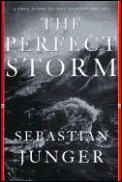
I'm on book tour, and even though
War is not a political work, people are asking me very political questions about it. Should we be in Afghanistan? Should we pull out? What about civilian casualties? Is there any such thing as a "good" war, or are all wars by definition evil? There are no easy answers — I wish there were — and coming to any useful conclusion requires a person to let go of any political freight they may be carrying.
My experience in war started in Bosnia in 1993. A quarter-million civilians died in the ethnic conflict there, and the carnage finally stopped when NATO forces bombed Serb positions around Sarajevo and forced a rough peace. The triggering event was when Serb militias machine-gunned seven thousand men and young boys into pits after overrunning the city of Srebrenica. My career reads like a human rights report from the past decade and a half: Kosovo, Sierra Leone, Liberia, Macedonia, Afghanistan. These conflicts killed tens of thousands of innocent people, and the leaders who perpetrated these crimes were immune to the entreaties and diplomatic efforts of the international community. Only military action by Western forces — or the threat of military action — brought those conflicts to a stop. Were those military actions immoral? Were they more immoral than standing by and watching?
 I first went to Afghanistan in 1996. I was on assignment to investigate jihadist training camps in the Tora Bora mountains south of Jalalabad. Weeks after I left, Taliban forces swept through most of the country and established a repressive regime that waged war for the next five years against an alliance of warlords in the north. As always, it was the civilian population that suffered — both because of the fighting and also because of the endemic poverty in a country locked in an armed struggle. Infant morality was on the order of 25 percent. A large percentage of the population was living in refugee camps along the Pakistan border. Afghanistan was a rogue nation recognized by only three countries in the world; with no extradition treaties, it was the perfect place for a group like Al Qaeda to be based. There was no way for the international community to get at them without physically going in with a military force.
I first went to Afghanistan in 1996. I was on assignment to investigate jihadist training camps in the Tora Bora mountains south of Jalalabad. Weeks after I left, Taliban forces swept through most of the country and established a repressive regime that waged war for the next five years against an alliance of warlords in the north. As always, it was the civilian population that suffered — both because of the fighting and also because of the endemic poverty in a country locked in an armed struggle. Infant morality was on the order of 25 percent. A large percentage of the population was living in refugee camps along the Pakistan border. Afghanistan was a rogue nation recognized by only three countries in the world; with no extradition treaties, it was the perfect place for a group like Al Qaeda to be based. There was no way for the international community to get at them without physically going in with a military force.
That, of course, was what happened after the attacks of 9/11. I was with the Northern Alliance when they swept into Kabul, backed up by American air power, and I remember strangers hugging me on the street when they found out I was American. For a brief while we were seen as liberators, and something like 90 percent of Afghans approved of the American military action in their country. This was not an invasion; it was a rescue mission.
The tragedy, of course, is that this good will was squandered by inexcusable mistakes and lack of commitment on the part of the United States. In the years following 9/11, the American military presence in Afghanistan stayed under 20,000 men. (By comparison, there are over 30,000 cops in New York city.) It wasn't nearly enough to maintain stability in that country — and without stability, there was no way to establish good governance or a healthy economy. Over the next few years the Taliban filled the vacuum left by a weak NATO presence and now we are facing the agonizing question about what to do.
 The problem in Afghanistan is not a military one. By that I mean the Taliban are not invincible: they are ten or twenty thousand poorly-equipped men living a rough existence around the edges of Afghan society. The Western armies drove the Nazi war machine out of Europe and defeated them in their homeland; if we can do that, I think we can probably defeat the Taliban. It is a question of political will at home, not of military obstacles in the mountains of Afghanistan. Where are the European countries in this? France, Spain, Italy, Holland, England — they all suffered attacks from Al Qaeda, or nearly did, and yet only England has a significant troop presence in Afghanistan. And where are the Islamic countries? Egypt, Saudi Arabia, Jordan, Morocco... they are considered apostate regimes by bin Laden and have suffered their own terrorist attacks as well. If NATO forces pull out of Afghanistan, Al Qaeda will probably come across the border and resume operations. (A rogue state that they control would be far more secure for Al Qaeda than a temporary refuge in the tribal areas of Pakistan.) The entire world will potentially be touched by the chaos in Afghanistan, as it was on 9/11.
The problem in Afghanistan is not a military one. By that I mean the Taliban are not invincible: they are ten or twenty thousand poorly-equipped men living a rough existence around the edges of Afghan society. The Western armies drove the Nazi war machine out of Europe and defeated them in their homeland; if we can do that, I think we can probably defeat the Taliban. It is a question of political will at home, not of military obstacles in the mountains of Afghanistan. Where are the European countries in this? France, Spain, Italy, Holland, England — they all suffered attacks from Al Qaeda, or nearly did, and yet only England has a significant troop presence in Afghanistan. And where are the Islamic countries? Egypt, Saudi Arabia, Jordan, Morocco... they are considered apostate regimes by bin Laden and have suffered their own terrorist attacks as well. If NATO forces pull out of Afghanistan, Al Qaeda will probably come across the border and resume operations. (A rogue state that they control would be far more secure for Al Qaeda than a temporary refuge in the tribal areas of Pakistan.) The entire world will potentially be touched by the chaos in Afghanistan, as it was on 9/11.
And then there are the Afghans. Sometimes people say to me that we should pull out our troops so the war can stop. That statement always amazes me: Afghanistan in the 1990s was an unmitigated bloodbath. Rival warlords armed by the United States fought for control of the country and, in the process, killed tens of thousands of civilians. Taliban forces finally took control and became locked in a vicious frontline battle against the relatively enlightened forces of Ahmed Shah Massoud. In that context, the fighting of the last eight years has been blessedly limited. Those dark days are sure to resume if the West pulls out. The soldiers in Afghanistan are viewed by the locals in much the same way as police in high-crime neighborhoods: not very well-liked, but God help us if they ever leave.